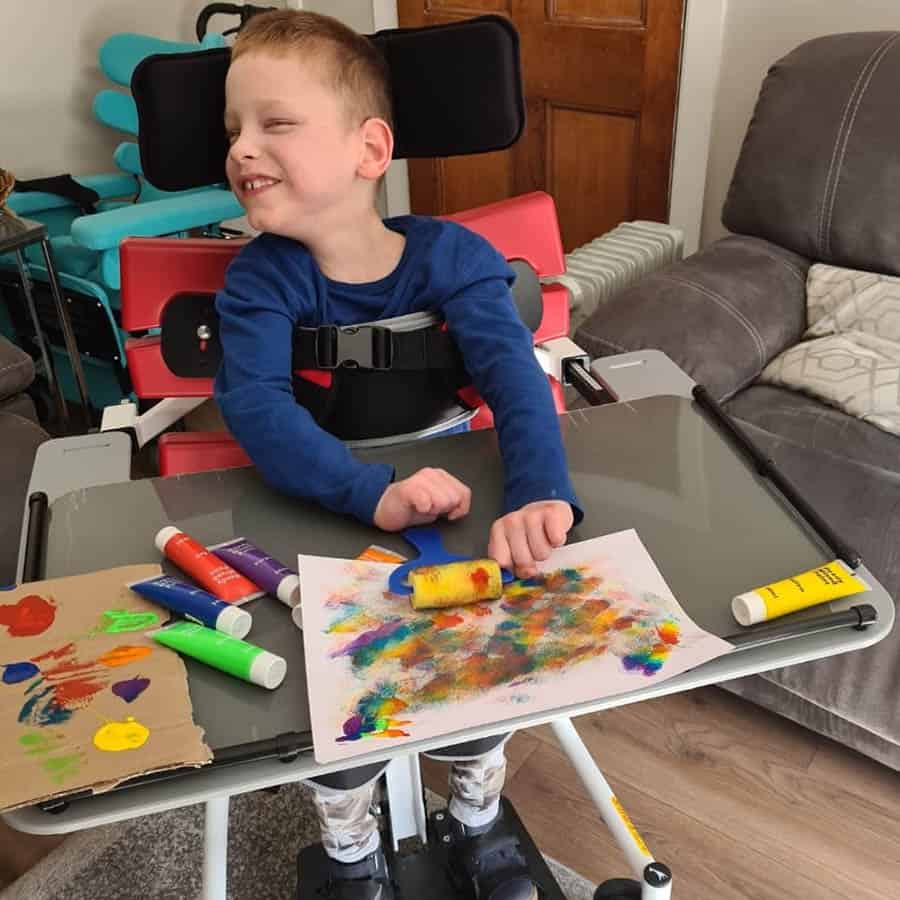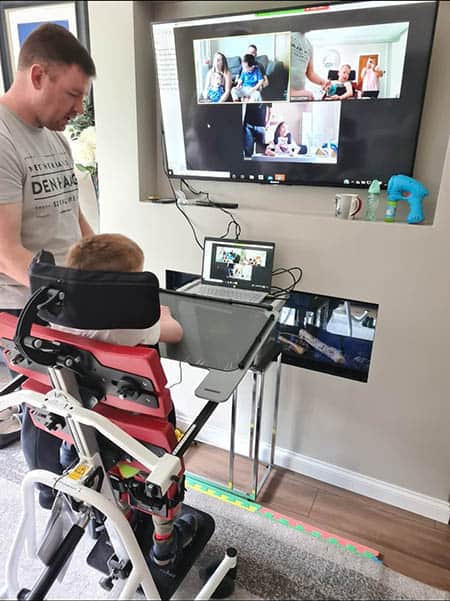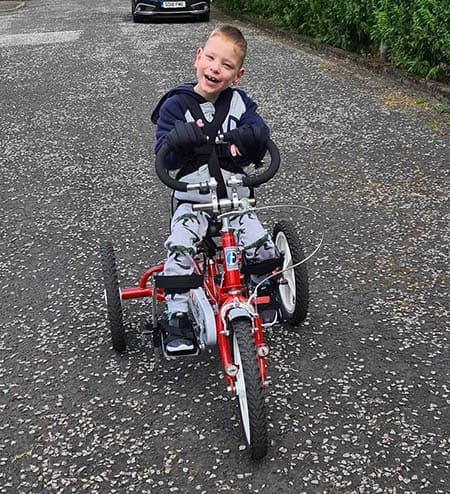CASE STUDY: How a 3-in-1 standing frame has helped ‘inspirational’ young boy with CP during lockdown

Seven-year-old Ashton ‘AJ’ McPhee, who was born 23 weeks premature, lives with quadriplegic cerebral palsy and global development delay. For World Cerebral Palsy Day (6 October), Ashton’s Mum Kerry, a frontline emergency service worker, has spoken of how life was turned upside down when the UK went into its initial coronavirus lockdown in March.
The pandemic has affected billions of people worldwide, but for 37-year-old Kerry, it made an already challenging life all the more difficult. Both Kerry and her partner are frontline emergency workers for the Scottish Ambulance Service and Police Scotland, respectively. They have carers visit their home three times a week to assist with Ashton’s daily care.
In order to keep Ashton safe, both Kerry and Sam were unable to attend work for six months – the nature of their jobs meant that there was ‘far too much risk involved’.
The couple also took the decision to stop Ashton’s carers attending during lockdown, as due to his premature birth, Ashton also has a history of severe chronic lung disease.
This, combined with his cerebral palsy, meant that when lockdown started, he was in the shielding category – something which meant that all of a sudden, the family were at home together; a stark contrast to normality when they are at times ‘passing ships’, as Kerry describes.
Kerry said: “It’s been really important for us to try and remain upbeat and positive during a really uncertain time. There were, and still are, a lot of negative media reports which can have a huge impact on your mental wellbeing.
“We try and find something positive every day, no matter how small. Two huge positives for us right from the start were having time to stay at home and spending lots of quality time together, which along with fantastic support from our employers, meant that it was nice not to have to worry about work and enjoy a slower pace of life.
“Ashton needs routine, it stops him becoming overwhelmed with change. So, we quickly had to adapt Ashton’s daily routine in order for him to adjust to our new way of living. We had to find a balance that structured his days but was stimulating enough that he didn’t become bored while being at home most of the time.”
Above all else, however, the most important thing for Ashton, Kerry and their family during lockdown has been the need to look after themselves, and each other – something which has become all the more important now that the family find themselves back in a local lockdown as the winter months approach.
“Be gentle on yourself,” said Kerry. “It’s ok to admit that you’re struggling, you’re only human and everyone has their coping limits. If you’re overwhelmed, it’s really important to reach out and ask for support, and it’s vital to do small things daily, to look after your own wellbeing. Simple things like going for a walk or just standing outside for a few moments for a breather help relieve the pressure of lockdown life.
“Everyone’s social life is suffering, so it’s really important to keep in touch with friends, fellow special needs parents and family virtually, and to check in with each other all the time. Virtual support networks are vital, especially when you can’t physically socialise.”

“Standing is a very important part of his daily physiotherapy and provides multiple health benefits for Ashton,” added Kerry. “His Jenx Multistander has played an important part in allowing Ashton to enjoy his daily activities and play.
“For example, we made sure that each day, he used his Multistander – sometimes he would play with toys or watch his favourite cartoons, other days he did activities in his standing frame like painting, baking or messy play.”
Richard Harvey, National Clinical Training Manager at Jiraffe, talked up the role the Jenx Multistander has played in Ashton’s young life.
“By adhering to a standing program, Ashton gains many health benefits,” said Richard. “Not only does it give him another perspective to interact from, but the evidence shows that being in an upright weight-bearing position improves bone mineral density and helps with hip formation.
“Many children with CP who have high muscle tone can benefit from standing. Being able to fully extend their hips and knees gives the hamstrings a great stretch and contributes to maintaining good length in the muscle.”
In addition to other activities, Ashton takes part in regular virtual music classes in his Multistander, with the six-year-old able to stand tall while playing his favourite musical instruments.
“These classes are the highlight of Ashton’s week,” said Kerry. “We decided with Ashton’s best friends and their parents that we could do our own virtual music classes via Zoom. These have been a lot of fun!
“We would also have themed music classes every few weeks too. We’ve had a Scottish theme, a Disney theme, a summer music festival theme, an Oscars theme, a 90’s theme, a Christmas theme and a beach party theme.
“Ashton loves lots of stimulation and being busy, so it was really important that we filled our days with fun activities, not just to keep boredom at bay but for our general mental health also. With us all being at home, we could put lots of effort into our themed classes – the adults enjoyed it as much as the kids!

Richard continued: “The evidence shows that starting to stand from as early an age as possible (around 12 months), gains better outcomes in terms of normal hip development and gait pattern.
“It is important for children to keep standing and following their postural management programs so that they maintain healthy muscles and bones. Standing has also been shown to reduce muscle spasticity in children with CP and being in a more upright position allows gravity to take affect and aids with digestion, bowel and bladder functions. This can avoid constipation and allow children to live a far more comfortable pain free life.”
Holly Jenkins, Director at Jiraffe, concluded: “Ashton and his family are a true inspiration – so many of us could do a lot worse than to take a leaf out of their book when it comes to handling lockdown.
“Ashton and his family’s story is one which has touched all of us at Jiraffe and we’re extremely grateful that Kerry has provided such moving insight into how they have got on in the last few months.
“We’re so happy to have been able to play a part in enabling Ashton to continue getting the best from life despite extremely difficult circumstances. We will always be there to support children and young people all across the UK who need vital access to life-changing – and at times, life-saving – postural support equipment.”

